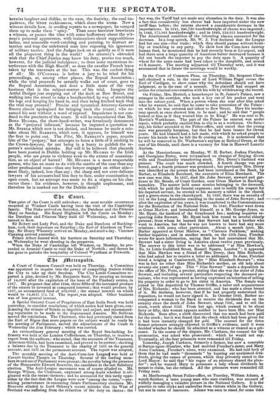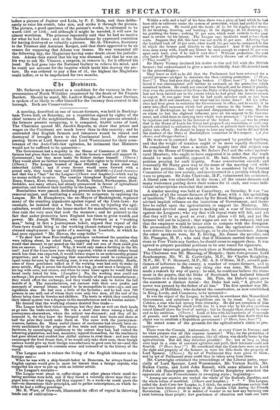Zbe IfIetropolis.
A Court of Common Council was held on Thursday. A Committee was appointed to inquire into the power of compelling traders within the City to take up their freedom. The City Lands Committee re- ported a plan, devised by Mr. Benjamin Scott, for securing an income of 14,0001. after the expiration of the lease of the Finsbury estates, in 1867. He proposes that after 1844, three-fifths of the increased produce of the estates be invested at compound interest ; that would produce. by 1867, an accumulated fund of 482,0621. ; the annual interest on which would be 14,461/. 17s. 7d. The report ,was adopted. Other business was of less general interest.
A Special General Court of Proprietors of East India Stock was held yesterday, to consider resolutions, of which notice had been given, con- demning the seizure of Scinde as impolitic and unjust, and recommend- ing reparati6n to be made to the dispossessed Ameers. Mr. Sullivan moved the resolutions. The Chairman, who had previously stated from the Earl of Ripon that more papers on the subject would be ready by the meeting of Parliament, moved the adjournment of the Court to Wednesday the 21st February ; which was carried.
An extraordinary general meeting of the Royal Sea-bathing In- firmary was held at the London Coffeehouse, on Thursday, to receive a report from the auditors ; who stated, that the accounts of the Treasurer, Alderman Gibbs, had been examined, and proved to be correct ; showing a balance due by the Treasurer to the charity of 1411. on the general account, and 3231. on the permanent account. The report was adopted.
The monthly meeting of the Anti-Corn-law Leagued was held at Covent Garden Theatre on Thursday. Several of the leading mem- bers in and out of Parliament were present; the novelty being the presence of the Honourable Edward Bouverie, the candidate at the last Salisbury election. The Anti-League movement was of course alluded to. Mr. George Wilson, the Chairman, expressed strong doubt whether it ori- ginated with the tenant-farmers ; and be accounted for this tardy oppo- sition by the fact that the League were now "among the voters,"—pro- mising perseverance in contesting future Parliamentary elections. Mr. Bouverie alluded to Lord Orkney's recent mistake that the West of Scotland was suffering from the reduction of the duty on cheese: the
fact was, the Tariff had not made any alteration in the duty. It was also a fact that considerably less cheese had been imported under the new tariff than before ; the returns showed a considerable decrease in the importations. In 1841, 246,730 hundredweight of cheese was imported ; in 1842, 175,961 hundredweight ; and in 1843, 158,951 hundredweight. The deteriorated condition of the labouring classes accounted for the decrease. In a long speech, Mr. W. J. Fox declared that the League had but one aim—free trade; which they should pursue without hosti- lity or truckling to any party. To show how the Corn-laws destroy human food, he mentioned that he had recently been at Liverpool, and had there seen a large quantity of American butter destroyed because it did not benefit the importer to pay the duty upon it. A quantity of wheat for the same cause had been taken to the dunghills, and mixed. wi:h manure. The meeting adjourned till Thursday next, and it was announced that in future the meetings would be weekly.
In the Court of Common Pleas, on Thursday, Mr. Sergeant Chan- nell obtained a rule, in the cause of Lord William Paget versus the
Earl of Cardigan, to show cause why the defendant should not have judgment, as in the case of a nonsuit. The plaintiff had stopped an action for criminal conversation with his wife by withdrawing the record. On Friday, Mrs. Brettell, a housekeeper in St. James's Palace, saw a stranger in the corridor, who took a key out of his pocket and went into the colour-yard. When a person whom she sent after him asked what he wanted, he said that he came to take possession of the Palace ; on which he was arrested and taken to Bow Street. Here his incohe- rent speech at once showed him to be mad ; and he said that " people looked at him as if they wanted him to be King." He was sent to St. Martin's Workhouse. The part of the Palace he entered was under repair, which probably enabled him to slip in as a workman. On Satur- day, his father attended at the Police-office, and stated that the young man was generally harmless, but that he had been insane for eleven
years. He had himself had a belt made, with which he asked people to secure his hands when he felt the fit coming on. It is understood that he will be removed to Dr. Warburton's asylum at Bethnal Green, at the cost of his friends, until there is a vacancy for him in Hanwell Lunatic Asylum.
At the Mansionhouse, on Monday, W. H. Barber, Joshua Fletcher, and Georgians Dorey, were reexamined on charges of forging divers wills and fraudulently transferring stock. Mrs. Dorey's husband was present. The court was much crowded. A fourth charge was pre- ferred, and a fourth prisoner was produced ; but previously Mrs. Dorey was identified as the person who had been introduced at the Bank, by Barber, as Elizabeth Burchard, the executrix of Eliza Burchard. The new case was this. In 1827, died Mr. John Stewart, steward and gar- dener to Mr. Strode, of Court Garden, near Great Marlow in Bucking- hamshire. The master held some monies belonging to the deceased, with which he paid the funeral expenses; and to testify his respect for his departed servant, he erected to his memory a tablet in the church and a grave-stone in the churchyard. In 1826, there was an annuity of 51/. in the Long Annuities standing in the name of John Stewart ; and ----gn" after the expiration of ten years, it was transferred to the Commissioners for the Reduction of the National Debt. In 1840, Fletcher went down to Great Marlow, and introduced himself, as a Mr. George Jones, to Mr. Hyatt, the landlord of the Greyhound Inn ; making inquiries re- specting John Stewart. Mr. Hyatt took him round to several elderly persons ; from whom he learned that Stewart had had a brother who went to America, but that he was not known to have had any more relations ; with some other particulars. About a month later, Mr.
Barber appeared at Great Marlow, as " Clarence Peckham," making further inquiries ; and in another month, on the 25th June, Fletcher wrote for more information, saying that he had ascertained that Mr.
Stewart had a sister living in America about twelve years previously.
The answer to this letter was to be addressed " at Miss Hawker a, No. 24 Little Guildford Street, Russell Square, London ": it appeared that Miss Hawkes was a friend of Mrs. Dorey, then Miss Richards, who had asked her to receive a letter so addressed. In June, Fletcher hired a lodging at Camberwell, :for " Miss Elizabeth Stewart "; who was in fact no other than Miss Richards's mother, an old lady about seventy-six years of age. This " Miss Stewart" made a deposition in the office of Mr. Potts, a proctor, stating that she was the sister of John Stewart, and including several particulars respecting the deceased an- nuitant, who was represented as having expressed an intention of selling his property in order to go to his sister in America. The female was joined in this deposition by Thomas Griffin, a tailor and acquaintance of Mrs. Richards; who has been arrested, and has made a clean breast of it. He declares, however, that if he had properly understood the deposition, he would not have signed it. In October 1840, Barber ac- companied a woman to the Bank to receive the dividends due on the annuity since the death of John Stewart, about 7001., and to sell the stock, worth about 6521. From her age, which seemed to be about forty or fifty, this woman appears neither to have been Mrs. nor Miss Richards. Soon after, a clerk discovered that too much had been paid for the stock ; but it was found that the check which had been given for
it had been instantly changed for gold. The counsel for the three former prisoners strongly objected to Griffin's evidence, until it were
decided whether he should be admitted as a witness or treated as a pri- soner. In the course of the dispute, Mr. Clarkson, the counsel for the prosecution, was asked who prosecuted ; which he would not say. Eventually, all the four prisoners were remanded till Friday. Yesterday, Joseph Cuckson, formerly a farmer, but now a constable at Barton-upon-Humber, who had married Fletcher's sister, and Mary Anne Cookson, ,Fletcher's niece, were examined. He had told both of them that he had made " thousands " by hunting out unclaimed divi- dends, giving the names of persons, which they privately stated to the Lord Mayor : he said that " his rogue of an attorney shared the plun- der " ; and he wanted Mary to personate a lady whose dividends he meant to claim, but she refused. All the prisoners were remanded till Friday next.
At Marlborough Street Police-office, on Tuesday, William Adams, a watch-finisher, a lame young man who uses crutches, was accused of wilfully damaging a valuable picture in the National Gallery. It is the practice to take sticks and umbrellas from visiters while in the Gallery, but not in cases of lameness. Adams was seen to stand for some time
before a picture of Jupiter and Leda, by P. F. Mohr, and then delibe- rately to raise his crutch, take aim, and strike it through the picture. The picture, a good specimen of the painter's works, is estimated to be worth 1201. or 150L; and although it might be mended, it will now be almost worthless. The prisoner repeatedly said that he had no motive for what he had done ; and at the Stationhouse he expressed contrition for having destroyed so valuable a picture. Mr. G. Thwaites, Secretary to the Trustees and Assistant Keeper, said that there appeared to be no reason for supposing that Adams was insane. He was remanded till the following day, the Magistrate having some doubt about his jurisdic- tion. Adams then stated that his leg was diseased, and that he was on his way to ask Mr. Vincent, a surgeon, to remove it ; for it affected his head. He had gone into the National Gallery to relieve his mind, and he could not account for the impulse which made him destroy the pic- ture. He was ordered to pay a fine of 51., the highest the Magistrate could inflict, or to be imprisoned for two months.



























 Previous page
Previous page